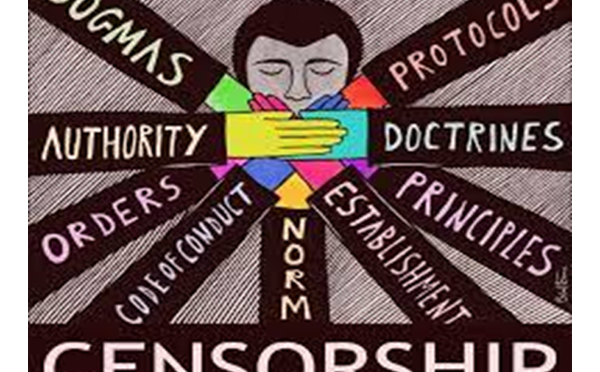AUTHORITARIANISM AND INTOLERANCE: NARRATIVES FROM ASIA
Posted on : March 16, 2021Author : Sristhi Ghosh

Authoritarianism is a definite attribute of the non-democratic and failed democratic regimes of the world. K. Stenner in ‘The Authoritarian Dynamic’ (2005) provides evidences to suggest how authoritarianism is negatively related to tolerance, tending to be punitive to things that are not imaginative or real to their ideology. Lack of tolerance, limited rights and individual freedom to thought and action are what characterises authoritarian culture. It is a proven hypothesis that authoritarianism corresponds to increased intolerance and tendencies of threat and exclusion to outgroup. Human Rights violations become a serious concern in authoritarian regimes. As much, in 2020, authoritarian regimes of China and Pakistan were globally called out as “World’s Worst Human Rights Abusers”[i].
Political authoritarianism finds its presence in South, South-east and East Asia. Pakistan and China are classic examples. Authoritarianism in Pakistan finds its roots from the history of colonial rule. While India made significant and successful efforts to democratise itself, Pakistan records what can be called a failed transition to democracy. Authoritarian predispositions characterises Pakistan’s political culture, whether under civilian or military governance. The East Asian giant, China on the other hand adopted an authoritarian political system under Communist Party of China since the 1949 revolution. In China, democratic values of dissent and diversity are perceived as threats to normative values, showing signs of conservatism. Instead, unity and uniformity are norms that are desired. This article aims to shed light on the politics of intolerance in these two authoritarian Asian countries in the contemporary scenario.
Intolerance against Women Rights Activism
Pakistan is a country, highly intolerant to recognising rights for women. The promise made by Nawaz Sharif to work for the cause of women empowerment on 2015’s International Women’s Day is still a dream than a reality. The reality instead is legal and institutionalized violence and discrimination against women. Islamic laws continues to be intolerant to rights of women- as a wife to file a divorce or for a mother to fight for legal custody. The laws of inheritance too are gender discriminatory in nature. The patriarchal society is highly intolerant to even basic rights of women and fails to criminalize issues of domestic violence and other gender specific violence. Women’s social mobility in Pakistan is strictly restricted and controlled. Their presence in economic and educational sectors are limited. Pakistani women are trapped in a web of dependency and subordination due to their low social, economic, and political status in society. This derogatory status of women in Pakistan has created a desire for equal rights, empowerment and social change. Rise of activism and demand for rights have however triggered the conservatives.
Young women activist Malala Yousafzai[ii] was shot in the head by the Talibans for defying a ban on female education. She later survived the gun shot to expose the realities of life of a woman in Pakistan. She continues to campaign and fight for women’s right to get educated despite of multiple assassination threats. This courage has won her several international recognitions. Mukhtaran Bibi[iii], a Pakistani Human Rights Activist was subjected to honour punishment and was gang raped on orders of panchayat. Hina Jilani[iv], a leading Pakistani pro-democracy and human rights campaigner was subjected to repeated threats and intimidation, arrests and abuses for her extraordinary work. Several others like Sabeen Mahmud[v] and Karima Baloch[vi] had to lose their lives in an effort to fight for rights of women in Pakistan. Baloch, who was found dead in Toronto in December 2020, lived as a refugee in Canada due to threats received after highlighting human rights violations in Baluchistan and her critic of Pakistani government. In 2016 she featured “BBC 100 Women 2016” for her fights against state sponsored human rights violations, tortures and abductions of women in Pakistan. She was targeted for highlighting violence inflicted against women by the legal system and religious groups of the country. The trend of intolerance against women activism still continues as four women activists, working for an NGO dedicated to women’s rights, awareness and training were shot dead by a group of suspected militants on Monday, 22nd February 2021.[vii]
Uyghur Intolerance in China
Similar is the case of Chinese treatment of the Uyghur community. About eleven million Uyghurs, Turkic speaking Muslims from Central Asian region live in China’s north-west. Since 2017, there has been reports of severe repression, oppression and human rights violations against the religious minorities in China. The Chinese government has reportedly detained more than a million Muslims in re-education camps. The Chinese Communist Party, in the name of ‘vocational education and training centres’ has held millions of Uyghurs in captive, leaving half a million children shifted to Communist boarding schools where they are subjected to religious and psychological indoctrinations.
Global media reports[viii] obtained by BBC suggest that these persecuted Muslims are subjected to mass surveillance, forced detention, kidnapping, murders, torture, illegal organ removal and denied basic human rights like following their own religion. According to several first hand sources obtained by BBC[ix], the Uyghur women are subjected to systemic rapes, sexual abuses and tortures inside the re-education camps. Human Rights groups too pointed out how Chinese government gradually stripped away religious and other freedoms of Uyghurs, subjecting them to mass surveillance, detention, indoctrination, and even forced sterilisation. Tursunay Ziawudun, who fled Xinjiang, said “women were removed from the cells every night and raped by one or more masked Chinese men. She said she was tortured and later gang-raped on three occasions, each time by two or three men.”[x]
Such intolerance has deeply disturbed countries like US and UK, who have called out China’s ‘committed genocide against Uyghurs’[xi]. Similar condemnations also came from EU and Australia, while the Islamic countries remains silent. Australia’s Foreign Minister Marise Payne even requested United Nations to take immediate access in the region. “We consider transparency to be of utmost importance and continue to urge China to allow international observers, including the UN High Commissioner for Human Rights Michelle Bachelet, to be given immediate, meaningful and unfettered access to Xinjiang at the earliest opportunity,” she said. However, China continues to deny such accusations and claims these as measures of fighting domestic terrorism and separatism.
While intolerance is a global concern, the advance of desire for greater social conformity and resultant intolerance remains the greatest threats in Asia today. The Human Freedom Index, a global index measuring human freedom in its latest ranking of 2020 has placed Asian countries with lowest freedom score. The findings in the HFI suggest that ‘freedom plays an important role in human well-being, and they offer opportunities for further research into the complex ways in which freedom influences, and can be influenced by, political regimes, economic development, and the whole range of indicators of human well-being.’[xii] Based on these parameters, China ranks 129 and Pakistan 140 out of 162 countries. This also establishes an analysis that a strong relationship exist between human freedom, greater tolerance and democracy.
[i] https://www.independent.co.uk/news/world/un-human-rights-council-election-activists-eu-states-b1013002.html
[ii] https://www.biography.com/activist/malala-yousafzai
[iii] https://www.vitalvoices.org/people/mukhataran-bibi/
[iv] https://theelders.org/profile/hina-jilani
[v] https://www.aljazeera.com/news/2015/4/25/pakistani-rights-activist-sabeen-mahmud-shot-dead
[vi] https://www.aninews.in/news/world/asia/what-the-killing-of-karima-baloch-says-about-pakistan20210101162434/
[vii] https://inshorts.com/en/news/4-women-activists-shot-dead-by-suspected-militants-in-pak-1613987928662
[viii] https://www.financialexpress.com/defence/persecution-of-religious-minorities-in-china-and-islamic-nations-selective-concern/2195685/
[ix] https://www.bbc.com/news/world-asia-china-55794071
[x] https://www.bbc.com/news/world-asia-china-55794071
[xi] https://www.bbc.com/news/world-us-canada-55723522
[xii] https://www.fraserinstitute.org/sites/default/files/human-freedom-index-2020.pdf
Sristhi Ghosh
Intern, AGA





Leave a Reply